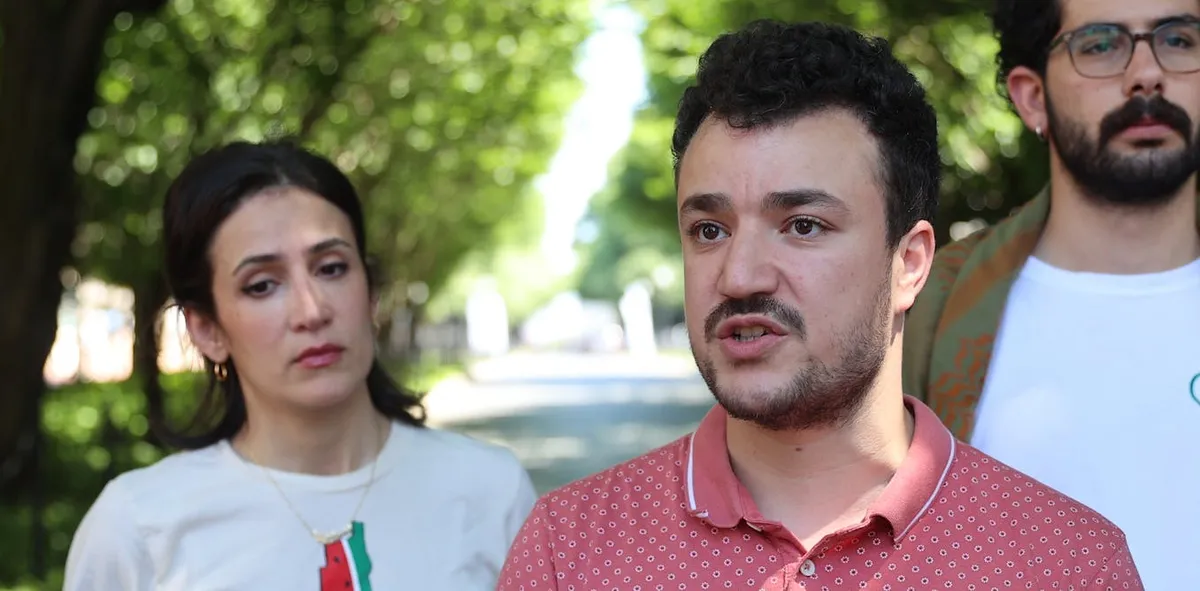
In a recent statement, Secretary of State Marco Rubio announced a controversial policy that targets lawful permanent residents who exhibit support for Hamas and engage in activities deemed anti-Jewish or antisemitic. This move follows a wave of Palestinian rights protests at universities across the United States in 2024. Rubio emphasized the government’s intent to deport individuals who, despite holding a green card, are involved in activities that could pose a threat to U.S. foreign policy. “If you end up having a green card—not citizenship, but a green card—while you’re here and those activities, we’re going to kick you out. It’s as simple as that,” Rubio stated on March 12, 2025, clarifying that this policy is not about suppressing free speech but about maintaining national security.
This policy has significant implications for Mahmoud Khalil, a recent graduate of Columbia University and a prominent figure in the Palestinian rights movement. Khalil, a Palestinian born in Syria, entered the United States on a student visa in 2022 and obtained his green card in 2024, granting him lawful permanent resident status. However, following his arrest on March 8, 2025, in New York City, the Department of Homeland Security determined that Khalil’s activities posed “serious adverse foreign policy consequences for the United States.” His potential deportation raises critical questions about the rights of lawful permanent residents in the U.S.
Currently, there are approximately 12.8 million lawful permanent residents in the United States. Legal experts highlight that while lawful permanent residents share many rights with U.S. citizens, there are significant differences that can impact their status. Notably, the Supreme Court has upheld that lawful permanent residents possess First Amendment rights; however, these rights can be limited if their political activities are deemed a security risk. Historically, cases dating back to the 1950s illustrate that lawful permanent residents can be deported for political affiliations, such as membership in the Communist Party.
Understanding the nuances between the rights of citizens and lawful permanent residents is crucial. Here are three major differences:
Lawful permanent residents have the right to live and work in the U.S. indefinitely, but their political rights are restricted. They cannot vote in federal or most state elections, nor can they serve on juries or hold certain public offices. While they can enlist in the military and apply for citizenship, their participation in the political process is significantly limited compared to U.S. citizens.
The distinction between citizens and lawful permanent residents extends to public benefits. The Supreme Court has acknowledged that Congress has the authority to impose rules on noncitizens that would be unacceptable for citizens. As a result, lawful permanent residents often have to wait five years to access programs like Medicaid and Supplemental Nutrition Assistance Program (SNAP), which are available to citizens.
Unlike U.S. citizens, lawful permanent residents risk losing their immigration status. Congress has enacted numerous provisions allowing for the deportation of noncitizens based on various criteria, including national security concerns. The current administration cites the 1952 Immigration and Nationality Act as the legal basis for deporting individuals like Khalil if they are believed to pose serious foreign policy risks to the United States.
Recent court cases have tested the boundaries of deporting lawful permanent residents based on national security and speech. The Supreme Court has ruled that deportable individuals can be removed from the U.S. regardless of other motivations behind the government's actions. For instance, the court has affirmed the government's right to deport noncitizens for technical visa violations, even in cases where there are broader implications of their political associations.
While lawful permanent residents maintain certain rights, including legal representation during deportation proceedings, they face a precarious situation that is markedly different from U.S. citizens, who cannot be deported under any circumstances. This discrepancy raises vital questions about the balance between national security and individual rights in the context of immigration law.
In summary, the deportation policy targeting lawful permanent residents associated with Hamas highlights the complexities of immigration rights in the U.S. As the legal landscape evolves, the implications for individuals like Mahmoud Khalil and countless others remain a pressing concern.